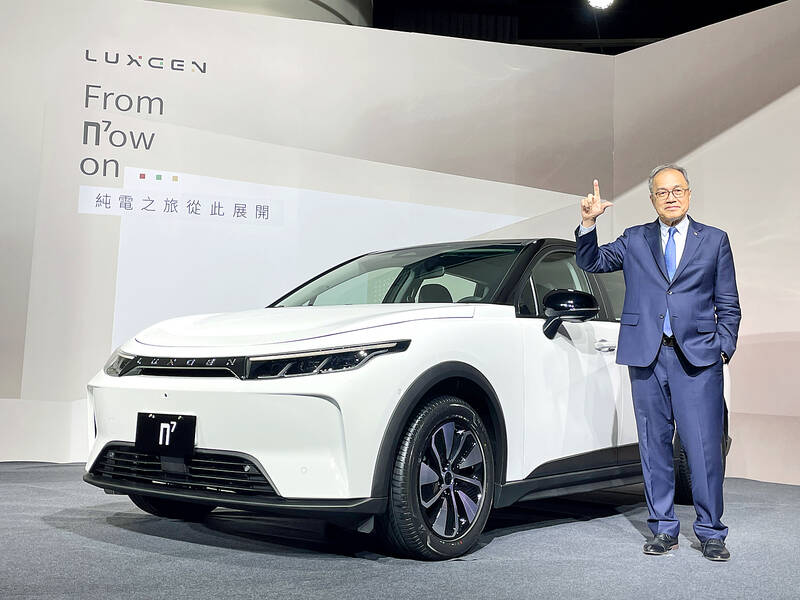Luxgen Motor Co (納智捷), a subsidiary of Yulon Motor Co (裕隆汽車), on Thursday unveiled the pricing and delivery schedule for its N7 electric vehicle (EV) model, which starts at just below NT$1 million (US$31,149).
The base model for the N7 sport utility vehicle will be priced at NT$999,000, Luxgen Motor chairman and acting president Tso Chi-sen (左自生) said at a press event in Taipei.
Luxgen has received about 25,000 initial orders for the EV model since preorders started in September last year, the automaker said.

Photo: Amy Yang, Taipei Times
Based on the company’s Web site information, the mid and top-line tiers of the N7 are NT$1.29 million and NT$1.34 million respectively.
Of the 25,000 orders placed, an estimated 30 percent, or 7,000 vehicles, are expected to result in actual sales, Tso said.
Production of the N7 is planned for next month and December, with deliveries to start from mid-January next year, he said, adding that the goal is to top Taiwan’s EV sales next year.
In addition, Luxgen said it plans to work with seven local charging station operators —Yes Charging, Tail, Evoasis, U-Power, iCharging, Evalue and Noodoe — to provide easily accessible EV charging.

NEW IDENTITY: Known for its software, India has expanded into hardware, with its semiconductor industry growing from US$38bn in 2023 to US$45bn to US$50bn India on Saturday inaugurated its first semiconductor assembly and test facility, a milestone in the government’s push to reduce dependence on foreign chipmakers and stake a claim in a sector dominated by China. Indian Prime Minister Narendra Modi opened US firm Micron Technology Inc’s semiconductor assembly, test and packaging unit in his home state of Gujarat, hailing the “dawn of a new era” for India’s technology ambitions. “When young Indians look back in the future, they will see this decade as the turning point in our tech future,” Modi told the event, which was broadcast on his YouTube channel. The plant would convert

‘SEISMIC SHIFT’: The researcher forecast there would be about 1.1 billion mobile shipments this year, down from 1.26 billion the prior year and erasing years of gains The global smartphone market is expected to contract 12.9 percent this year due to the unprecedented memorychip shortage, marking “a crisis like no other,” researcher International Data Corp (IDC) said. The new forecast, a dramatic revision down from earlier estimates, gives the latest accounting of the ongoing memory crunch that is affecting every corner of the electronics industry. The demand for advanced memory to power artificial intelligence (AI) tasks has drained global supply until well into next year and jeopardizes the business model of many smartphone makers. IDC forecast about 1.1 billion mobile shipments this year, down from 1.26 billion the prior

People stand in a Pokemon store in Tokyo on Thursday. One of the world highest-grossing franchises is celebrated its 30th anniversary yesterday.

Zimbabwe’s ban on raw lithium exports is forcing Chinese miners to rethink their strategy, speeding up plans to process the metal locally instead of shipping it to China’s vast rechargeable battery industry. The country is Africa’s largest lithium producer and has one of the world’s largest reserves, according to the US Geological Survey (USGS). Zimbabwe already banned the export of lithium ore in 2022 and last year announced it would halt exports of lithium concentrates from January next year. However, on Wednesday it imposed the ban with immediate effect, leaving unclear what the lithium mining sector would do in the